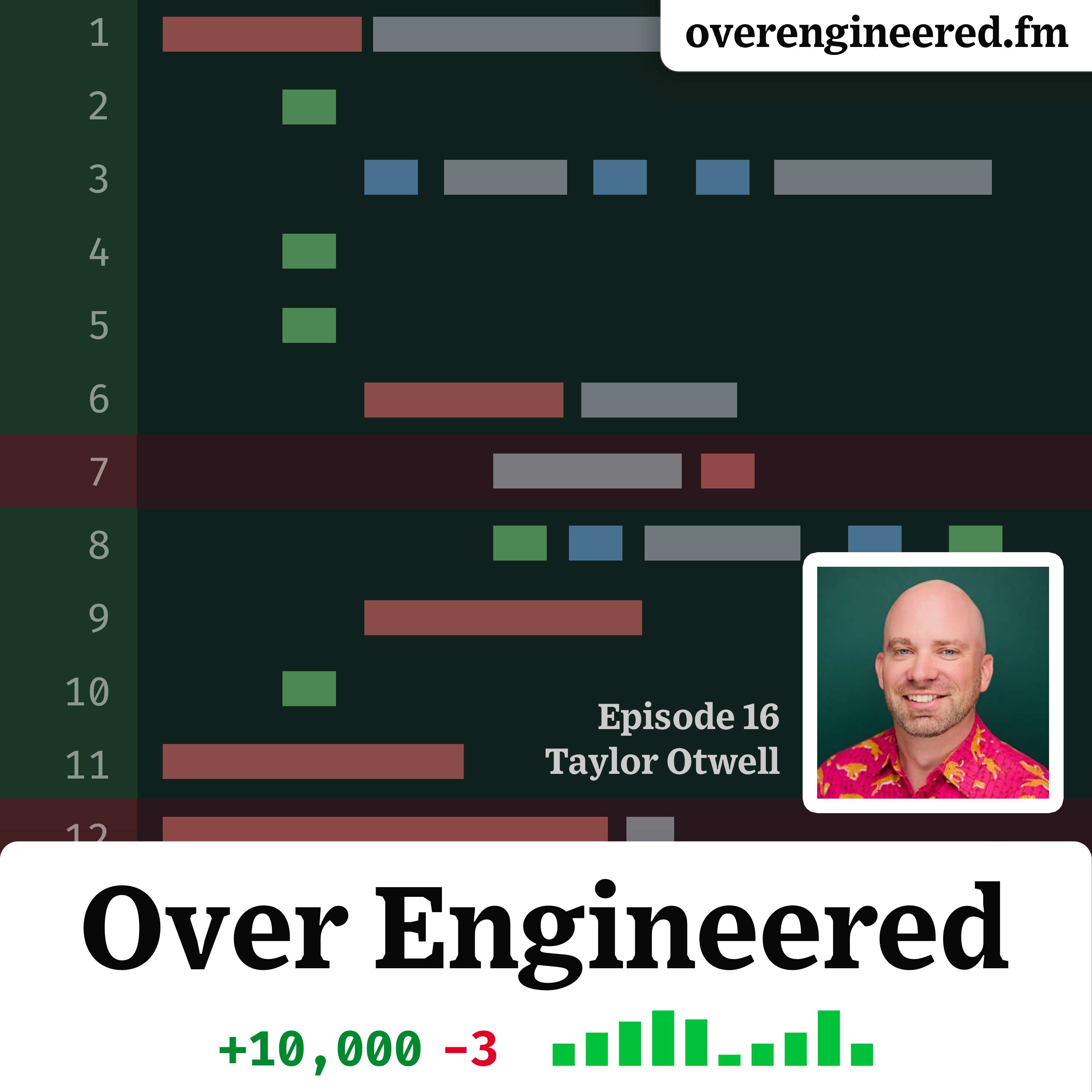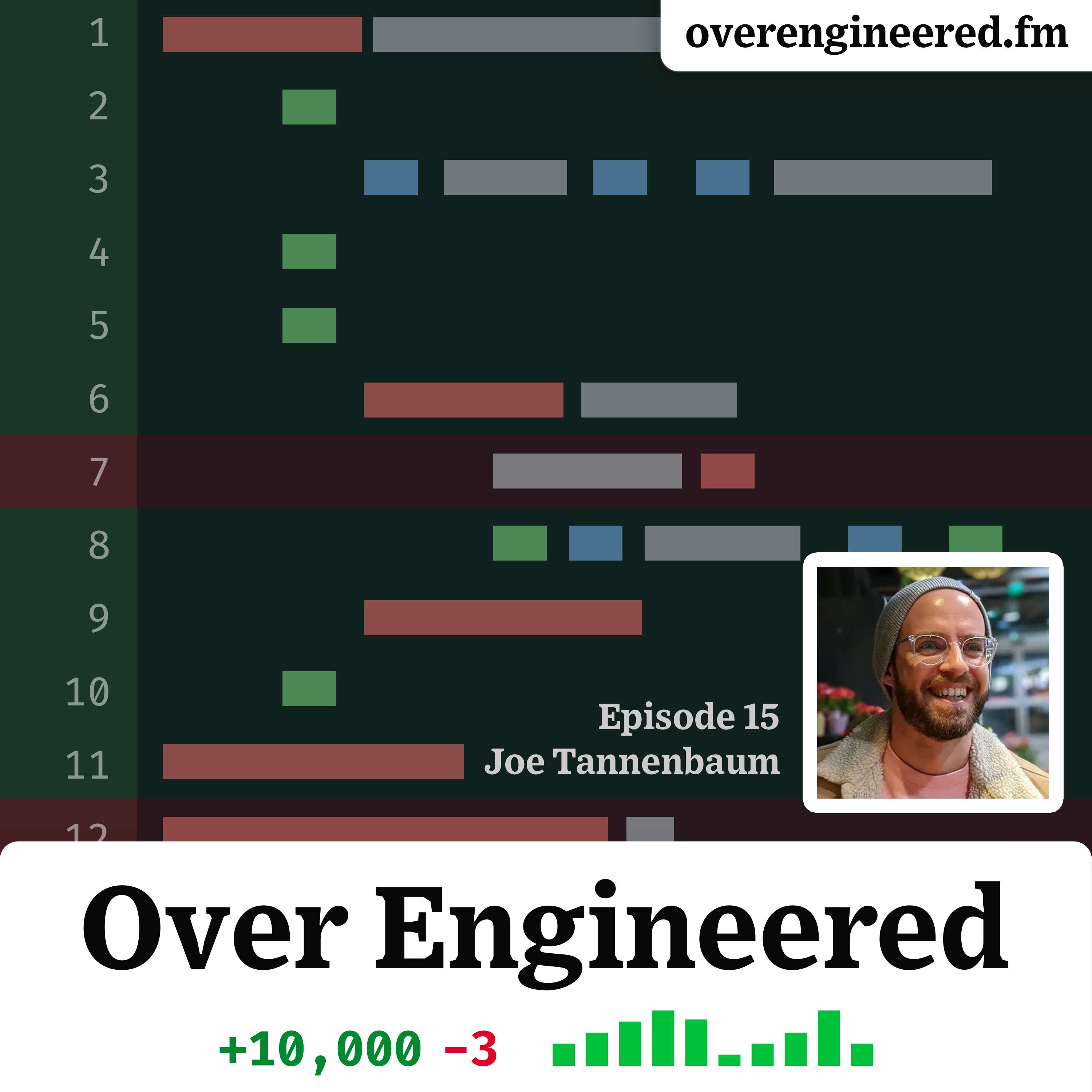Discover Over Engineered
Over Engineered

16 Episodes
Reverse
Taylor Otwell has been finding ways to improve Laravel for over a decade, but has only more recently set his sights on the front-end side of things. In today's episode, we sit down and talk about the current state of building UIs in Laravel, and what the future might hold.Links:Laravel VoltAire Form BuilderLaravel “Context” FeatureHooks PackageLaravel CareersBlade Parser
Joe Tannenbaum took the internet by storm with his incredible SSH CLI "experiments." In today's episode, Chris and Joe sit down to get into the messy details of parsing ANSI escape sequences and dealing with multibyte strings, but spend as much time talking about programming as art and life as an actor.Links:Joe Tannenbaum on TwitterJoe's "Lab" of CLI experiments"Kitchen" by Liza LouConveyor Belt packageRTSN.DEV
What are the best processes for small software development teams with high trust? In today's episode the InterNACHI software development team sits down with John Rudolph Drexler to talk about whether or not we need to estimate tickets or even bother with sprints…
As the saying goes: "There are only two hard things in Computer Science: cache invalidation and naming things." So in today's episode we dig into all the ways Ian is taking on one of the hardest parts of programming in his rewrite of their decades-running helpdesk software, HelpSpot. We talk about caching, a little bit of Laravel history, and about what it's like to run a successful software business for 20+ years.
Complex view logic can be hard to get right—particularly in server-rendered templates like Blade. We recently had to decide just how much a Laravel Blade component should do, and decided to hash it out on the podcast.
When applications grow—in scope, sheer lines of code, or the number of team members—how you organize things starts to matter a whole lot more. In today's episode, we talk with Mateus Guimarães about modularization: breaking your application into smaller modules. We explore some of the topics in his new Laracasts course, and talk about the decisions that informed building the modular package at InterNACHI.
It's been said that web development is 99% forms and tables. Today we talk with Adam Wathan about all the decisions that go into creating a great form builder API. Adam and the rest of the team at Tailwind recently launched the developer preview of Catalyst—a React UI library with a robust form system. We take a deep-dive into the API decisions behind Catalyst, and talk about how some of those decisions could impact the next version of Aire, a Laravel form-building package.
We all use our personal websites as an excuse for trying something new or over engineering what's usually a simple, low traffic site. In today's episode, Chris and Aaron talk about how to build a great personal website with "just Laravel" and imagine ways that static site generation, markdown editing, open graph, caching, SEO, and more could be improved in the Laravel ecosystem.
In today's episode, Chris and Caleb sit down and try to imagine what the perfect "hook" implementation might look like. Laravel, Livewire, and the upcoming Verbs package, all have to allow for hooking into logic at specific points, and each package has to handle this in its own unique way. What if there was a canonical way to hook into the lifecycle of a package that worked across the whole Laravel (and maybe beyond?) ecosystem?
And now for something completely different…In this episode, Chris and Daniel sit down to talk about a new event sourcing package they're working on called Verbs.
Most teams have encountered this basic scenario:Your application sends out a periodic report to a specific person in the company. Then, at some later point, either another team member wants to start receiving a copy of the report, or you need to remove the original recipient and add a new one.With a standard Laravel app, you're probably going to need to make this change by deploying a change—either to the environment, or a config file, or the Mailable class itself.In today's episode we dig into ways we could make it possible for non-technical users to manage outgoing email messages: from the recipient(s), to the message content, to even the logic that determines when and if a message is sent.
In this episode we indulge in the purest form of Over Engineering—a 90 minute discussion of a completely different application paradigm/architecture. Our team has used event sourcing to some degree, and we're considering using it more heavily in the future. But before we do, we're going to step back and ask ourselves if it's worth it…Some useful links:Event Sourcery YouTube SeriesSpatie Event Sourcing PackageSpatie Event Sourcing Course (paid)Event Sauce (and Spatie Laravel wrapper)
Over Engineered is all about those things that bug you but you never get a chance to "solve." Today's episode is about the dreaded "status" column.This is another topic that most developers will hit over and over. You have a model. You need to track the status. You add a status column, and then later a status timestamp "accepted_at", and then later an "accepted_by" column—and each time you cringe and wish there was a better way.Today we discuss a better way… maybe?
Season 1 continues with a discussion of how to deal with special database records that need to be referenced directly in code.We've all been there before: you've got a specific vendor that you need to write a custom command for, or a certain category that needs special handling, so you either hard-code the ID or slug and shudder slightly before moving on with your life. In this episode, we imagine a better—perhaps the best, even—way!
In the second episode of the podcast we talk with Tim MacDonald about a few other approaches to how you might manage other operations that happen before/during/after a database migration (or really any deploy step). Tim pitches a lower-level approach that spawns a whole new line of thinking.We also touch on some of the responses to episode one, including:Ed Grosvenor's "run once" commandLukas Heller's mention of the "path" option in artisan migrationsBrendan White's blog post on Data Changes in Laravel
In the first episode of the podcast we explore the boundary between database migrations and other operations that need to happen when the database is being migrated. How do you seed or manipulate data after new tables or columns have been added? In migrations? In one-off commands that you have to run manually? Running seeders in production? In tinker, Nova, or TablesPlus? We spend a whole hour talking about a topic that most people decide on in a few minutes.Items discussed on show:Chris' initial Twitter pollActions by The Dragon CodeLaravel Actions











